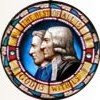14 hours ago
Sunday, August 22, 2010
Wednesday, August 11, 2010
Moved to Wordpress
My blog is moving to: http://wesleyanarminian.wordpress.com. If you follow the blog, please update your links!
I have become increasingly disappointed with blogger, particularly withe the comment moderation options. Nick Norelli gets the props for the move. He often preaches of the merits of Wordpress and gets another convert. :)
The blogspot blog will stay up (to help with link backs, etc). I'm turning on comment moderation here. And of course all new posts will go wordpress. Thanks for following the blog, and God bless! -Kevin
I have become increasingly disappointed with blogger, particularly withe the comment moderation options. Nick Norelli gets the props for the move. He often preaches of the merits of Wordpress and gets another convert. :)
The blogspot blog will stay up (to help with link backs, etc). I'm turning on comment moderation here. And of course all new posts will go wordpress. Thanks for following the blog, and God bless! -Kevin
Tuesday, August 10, 2010
How Revelation 3:20 Creates a Dilemma for Calvinism
In Revelation 1,2, and 3 John prophesies to the seven churches in Asia. The last group he addresses is the church in Laodicea. After addressing the Ladocians, he concludes with the following prophesy:
(Jesus speaking) Here I am! I stand at the door and knock. If anyone hears my voice and opens the door, I will come in and eat with him, and he with me. To him who overcomes, I will give the right to sit with me on my throne, just as I overcame and sat down with my Father on his throne. He who has an ear, let him hear what the Spirit says to the churches. -Revelation 3:20-22
This passage can be interpreted in two ways, both of which present problems for Calvinism.
Interpretation #1: This passage is applicable to everyone. Although Jesus is addressing the Ladocians, he uses universal language ("If anyone..", "he who has an ear..."). Thus this passage has application to everyone and helps to establish the doctrine of prevenient grace. This is usually the Arminian position.
Interpretation #2: Jesus is speaking only to the church in Laodicea, or to only to the seven churches in Asia. This passage is meant to apply to the original audience, and has no application to non-believers today. This is usually the Calvinist position.
If interpretation #1 is correct, we have a clear example of prevenient grace. The passage illustrates both the universal scope of grace, and the ability to resist grace. Jesus knocks on the door of each person, and the person can choose whether or not to open the door.
If interpretation #2 is correct, the Calvinist unwittingly creates another problem for himself. He disproves the doctrine of eternal security. Immediately prior Jesus speaks of "spitting out" the Ladocians because they are neither hot nor cold. If Jesus is addressing only Ladocian believers, the passage indicates that those same believers can become apostate (bold mine):
To the angel of the church in Laodicea write: These are the words of the Amen, the faithful and true witness, the ruler of God's creation. I know your deeds, that you are neither cold nor hot. I wish you were either one or the other! So, because you are lukewarm—neither hot nor cold—I am about to spit you out of my mouth. -Revelation 3:14-16
So the Calvinist is left with a dilemma. If the passage applies to non-believers, it teaches prevenient grace. If the passage applies to Ladocian believers, it teaches the possibility of apostasy.
(Jesus speaking) Here I am! I stand at the door and knock. If anyone hears my voice and opens the door, I will come in and eat with him, and he with me. To him who overcomes, I will give the right to sit with me on my throne, just as I overcame and sat down with my Father on his throne. He who has an ear, let him hear what the Spirit says to the churches. -Revelation 3:20-22
This passage can be interpreted in two ways, both of which present problems for Calvinism.
Interpretation #1: This passage is applicable to everyone. Although Jesus is addressing the Ladocians, he uses universal language ("If anyone..", "he who has an ear..."). Thus this passage has application to everyone and helps to establish the doctrine of prevenient grace. This is usually the Arminian position.
Interpretation #2: Jesus is speaking only to the church in Laodicea, or to only to the seven churches in Asia. This passage is meant to apply to the original audience, and has no application to non-believers today. This is usually the Calvinist position.
If interpretation #1 is correct, we have a clear example of prevenient grace. The passage illustrates both the universal scope of grace, and the ability to resist grace. Jesus knocks on the door of each person, and the person can choose whether or not to open the door.
If interpretation #2 is correct, the Calvinist unwittingly creates another problem for himself. He disproves the doctrine of eternal security. Immediately prior Jesus speaks of "spitting out" the Ladocians because they are neither hot nor cold. If Jesus is addressing only Ladocian believers, the passage indicates that those same believers can become apostate (bold mine):
To the angel of the church in Laodicea write: These are the words of the Amen, the faithful and true witness, the ruler of God's creation. I know your deeds, that you are neither cold nor hot. I wish you were either one or the other! So, because you are lukewarm—neither hot nor cold—I am about to spit you out of my mouth. -Revelation 3:14-16
So the Calvinist is left with a dilemma. If the passage applies to non-believers, it teaches prevenient grace. If the passage applies to Ladocian believers, it teaches the possibility of apostasy.
Subscribe to:
Posts (Atom)


